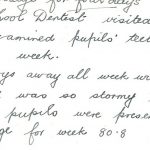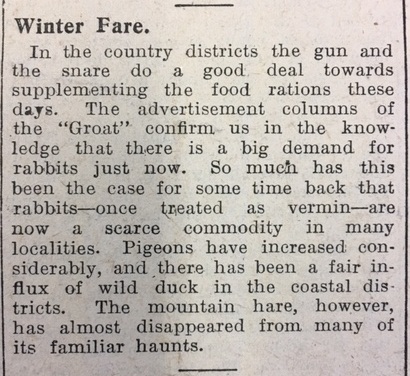
On 10 January the RAF mined the waters off Burma to put a temporary halt to Japanese shipping in the area. On 11 January “Operation Pointblank” began, a series of raids targeted at weakening the capability of the Luftwaffe. And on 12 January the first “Victory ship” was launched, SS United Victory; the Victory ships would be used to transport troops used in the D-Day landings.
Norseman noted in the John O’Groat Journal that in Caithness “the gun and the snare do a good deal towards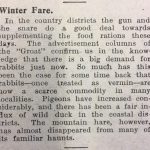 supplementing the food rations these days… [and] rabbits – once treated as vermin – are now a scarce commodity in many localities. Pigeons have increased considerably, and there has been a fair influx of wild duck in the coastal districts.”
supplementing the food rations these days… [and] rabbits – once treated as vermin – are now a scarce commodity in many localities. Pigeons have increased considerably, and there has been a fair influx of wild duck in the coastal districts.”
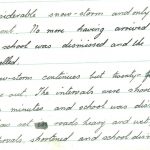 Otherwise, the main story of the county this week was bad weather. Bower experienced a heavy snowfall: the school log book records that on the 10th January, “Considerable snow-storm and only six pupils present. No more having arrived @ 11.00am the school was dismissed and the attendance cancelled.” Next day, “Snow-storm continues but twenty-four pupils came out… The school was dismissed at 2.30pm.” Finally on the 12th the entry reads, “Snow set in roads heavy and wet; 25 present… school dismissed at 2.30pm.”
Otherwise, the main story of the county this week was bad weather. Bower experienced a heavy snowfall: the school log book records that on the 10th January, “Considerable snow-storm and only six pupils present. No more having arrived @ 11.00am the school was dismissed and the attendance cancelled.” Next day, “Snow-storm continues but twenty-four pupils came out… The school was dismissed at 2.30pm.” Finally on the 12th the entry reads, “Snow set in roads heavy and wet; 25 present… school dismissed at 2.30pm.”
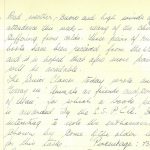
There was rough weather in Canisbay too. The head teacher recorded in the log book on 14 January: “Bad weather – snow and high winds affected attendance this week – many of the children suffering from colds. Three pairs of rubber boots have been received from the W.V.S., and it is hoped that a few more pairs will be available.”
Finally this week, the pupils of Ackergill School were up against in more ways than one. The log book records, “The School Dentist visited school and examined pupils’ teeth on Tuesday of this week. Two boys were away all week with ringworm. Monday was so stormy that only thirteen pupils were present.” 